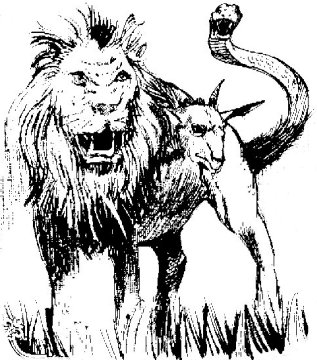|
PAGE ONE
Bellerophon was the brave and handsome son of
Glaucus and Eurymede, and the grandson of Sisyphus.
Some even claimed that he was the son of Poseidon, god of the
sea, for his sculpted body, quick wit and excellence of spirit
hinted of divine origin. In addition, his mother Eurymede had
been tutored by the great goddess Athena, lending more credence
to the theory that his father was Poseidon.
He originally was called Hipponous, but supposedly was given the
nickname Bellerophon after he killed a man named Belerus in
Corinth. Thus his name can be translated as "killer of Belerus"
(Bellerophontes) or "bearing darts" (Bellerophon for short).
Some sources insist that the myth of the killing of Belerus was
added later in an attempt to explain the hero's name.
In addition to the murder of Belerus, a further cloud hung over
our hero's head because during a quarrel he had also accidently
slain his own brother, Deliades. To atone for the murders
Bellerophon fled to Proetus, King of Tiryns, where he planned to
humbly request the king's purification by serving him loyally.
Hospitality, both to friends and strangers, was paramount in
ancient Greece. To refuse hospitality or comfort to others was
one of the highest forms of sacrilege, and often invited the
wrath of the gods, who severely punished transgressors.
King Proetus was happy to receive the handsome youth but, as
luck would have it, the king's young wife, Anteia (sometimes
called Stheneboea), fell in love with Bellerophon the instant
she laid eyes on him.
The infatuated queen tried every trick to get close to the
gorgeous youth, hoping to seduce him with her wealth and beauty.
Bellerophon, a guest in the royal palace, did the proper thing
and completely rejected the amorous advances of Anteia. He went
out of his way to avoid her, but when she finally cornered him,
Bellerophon told the queen that he wasn't interested in having
an affair with her, he had enough troubles already. Besides, he
was a guest in the house of Proetus and it would be most
dishonorable to thus deceive his gracious host, the king.
"You are very beautiful, your majesty, and I'm flattered that
you like me, but, no thanks, I'll pass," he said.
The vain woman was stunned. She wasn't accustomed to rejection
and had grown used to always getting her way. She turned on the
charm to the max, but our hero held firm to his values. No
matter how much Queen Anteia begged or threatened him, still he
was resolved to act nobly, finally slithering free and taking
his leave.
The queen was outraged! How dare he go? Did he not know the
consequences of refusing to do the queen's bidding?
Ah, the wrath of a woman scorned...Queen Anteia did a terrible
thing: Running to king Proetus disheveled and in tears, she
informed her dumbfounded husband that their young guest had
tried to violate her, and would have succeeded had she not
fought him off.
"You must have him killed at once!" she commanded her husband.
The king was incensed but dared not tempt the wrath of the gods
by causing harm to a suppliant. The rules of hospitality
prevented him from blatantly ordering the death of this vile
culprit, so he devised a sinister plan.
King Proetus summoned Bellerophon and told him that he was
sending him to Lycia, a kingdom ruled by his father in law, King
Iobates, who was his wife Anteia's father. He handed our hero a
sealed note that Bellerophon was to carry as a letter of
introduction, informing King Iobates that its bearer was to be
treated like a royal guest.
Some letter of introduction. The note that Proetus sent with
Bellerophon outlined the young man's supposed violation of his
wife Anteia, and asked that King Iobates gain revenge for his
daughter's ravishment. The visitor must be killed, it said.
Myth Man's note: That's where we get the phrase
'Bellerophontic Letters', meaning to unwittingly deliver
information that can prove harmful to the bearer.
Bellerophon received a royal welcome in Lycia, and after he had
bathed and refreshed himself he joined the king in a splendid
feast. For nine days the young visitor was entertained, with
every effort being made to please him. Eager to learn news of
his daughter, king Iobates asked Bellerophon if he bore any
tidings from Tyrins. Just then the young man remembered the
letter given him by Proetus and handed it to Iobates.
The king grew pale as he digested the letter's content. This
criminal must be punished, he thought, but Iobates didn't want
to invite the fury of the gods by mistreating a royal guest. So
he told Bellerophon that the letter instructed him to extend all
hospitality to his young visitor, and in turn he would have to
do the king's bidding.
"Then you can finally be purified for the unfortunate deaths
back at your homeland," he lied to Bellerophon.
Fair enough. Bellerophon, heroic impulses surging throughout his
being, was ready to tackle any challenge. Bring it on!
First up was the Chimaera.
This fire-breathing creature, sporting a lion's head, the body
of a goat and a serpent's tail, had taken up residence in Lycia,
and in short time had managed to terrorize the entire area,
killing and feasting on many innocent people.
BELLEROPHON MYTH
CONTINUES ON PAGE TWO

BELLEROPHON MYTH
CONTINUES ON PAGE TWO

BACK HOME

|







